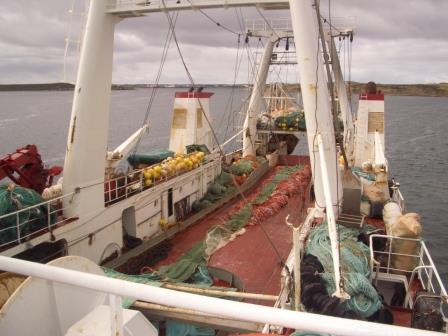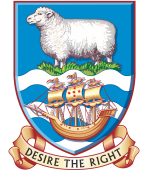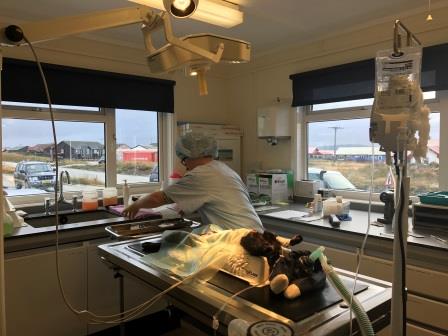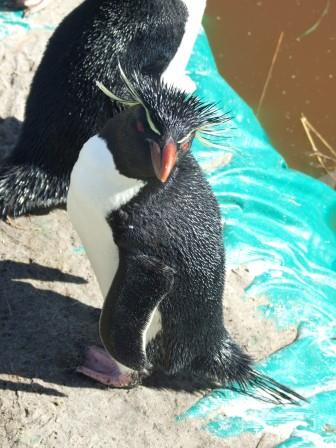Veterinary Services
The Veterinary Service section of the Department of Agriculture provides a wide range of services to the agricultural and urban community, as well as to the fishing industry. It has an advisory role for animal production and regulatory role by acting as the competent authority for the export of meat and fish into the European Union and other countries. It also provides a comprehensive clinical service to the farming and pet owning public as no private clinical practice is currently available in the Falkland Islands. The VS is staffed by a Senior Veterinary Officer, two Veterinary Officers, a Practice Manager, a Veterinary Nurse and a Veterinary Receptionist.
Clinical & Animal Health
The treatment of sick and injured animals and routine health care and surgery forms a major part of the veterinary workload. This is the area that brings the Veterinary Service in almost daily contact with members of the public, especially those based in Stanley. The Veterinary Officers provide an out of hours emergancy clinical service.
The importation of live animals and animal products is closely controlled and can only occur under a licence issued by the Veterinary Service. All live animals undergo a period of quarantine following arrival in the Islands. If you require information about importation of animals into the Falkland Islands, please contact the This email address is being protected from spambots. You need JavaScript enabled to view it.,
The only OIE (World Organisation for Animal Health) listed diseases known to exist in the Falkland Islands are Hydatidosis/Echinococcosis and Avian Chlamydiosis.
Bovine Brucellosis and Brucella ovis (B. Ovis) infection in sheep have been present in the Falkland Islands in the past but are now thought to have been eradicated.
Continual disease surveillance is a very important role of the Veterinary Service staff to demonstrate continued freedom of some diseases, control of others that do exist and the supervision of national animal population for any new or exotic disease.
We have a national cattle identification and tracing system in place which will aid with disease control in the event of an outbreak.
The hydatid eradication campaign has been running for almost thirty years and has been very successful. The campaign comprises:
- A five weekly dosing regime with Praziquantel (either Droncit or Drontal) of all dogs on the Islands
- Confining dogs when not actively being used for work
- Disposing high risk offals (i.e liver, lungs and heart) in a manner which denies access by dogs
- Killing sheep in dog proof enclosures
- Disposing of cull sheep in a manner which denies access by dogs
- Offal inspection by the Meat Hygiene Inspector at the Sand Bay abattoir, and by the slaughterer on-farm
- The hydatid eradication strategy
Animal welfare has become an increasingly important issue in world farming and the Falkland Islands needs to be aware of this and address those welfare issues that give cause for concern in the type of farming systems practised in these Islands. There are animal welfare codes (available to download below) for sheep, dogs, horses, cattle and pigs as well as a code for the transport of animals. This has become increasingly important now that animals are shipped and driven quite long distances for delivery to the export approved abattoir at Sand Bay.
The Veterinary Service is the regulatory and enforcement body for animal welfare legislation. Animal welfare enforcement duties are carried out in a sensitive and impartial manner, with emphasis being placed on relieving animal suffering. Most animal welfare enforcement is in response to complaints or concerns expressed by members of the public. All such complaints are handled in a confidential manner.
The Veterinary Service is closely involved in the annual Artificial Insemination (AI) and Embryo Transfer (ET) programmes to provide support to the reproduction specialists who come each year.
The Veterinary Service is frequently asked by other Government departments and Conservation to advise on a wide range of issues. Staff also work with Falklands Conservation to treat and rehabilitate injured wildlife.
Public Health
The export of meat and fish requires the Falkland Islands to have a designated competent authority, the officers of which are known as Official Veterinarians. The competent authority has been delegated to the Veterinary Service section of the Department of Agriculture. This means that one of the primary tasks of the veterinary service is to attest to the public health, animal health and the welfare under which animals and fish are farmed, caught and processed.

Inspection of fishing vessels occupies a major part of the veterinary services' time at certain periods of the year. The Fishery Products (Hygiene) Ordinance 1998 was passed in March 1998 and this and the subsequent amendments enact relevant EU regulations and directives in the Falkland Islands. It is the responsibility of the CA to ensure that the conditions laid down in these EU laws are met.
There are two aspects to the role of competent authority. The first is annual licensing inspection of Falkland Islands registered factory vessels and on-shore establishments to ensure compliance with EU regulations. Upon compliance, an approval number is issued which is valid for one year. As of the 30th May 2020 there are 17 Falkland Islands registered vessels approved and licensed and two on-shore establishments approved.
The second function of the competent authority is to issue health certificates for consignments of fishery products intended for export. Numbers of health certificates being issued has increased substantially over the past ten years.
Hydatid Disease Update
After the recent AAC meeting in which a paper on the future control of hydatid disease in the Falkland islands was discussed it was decided that this short final report and recommendations paper should be circulated to all farmers so that you can see the rationale behind the recommendations for the future control of hydatid disease in the Falkland Islands. This report can also be found in the veterinary section of the DoA website alongside the complete PhD thesis entitled “Understanding transmission and control of cystic Echinococcosis and other taeniid infections in the Falkland Islands



